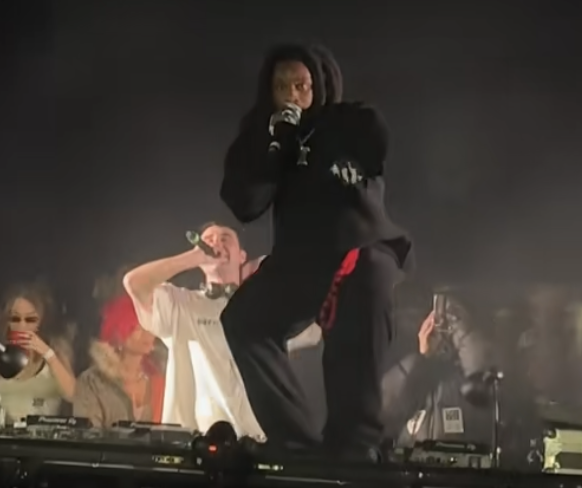Welcome to this week’s installment of The Week In Music Writing. Every Sunday, we’re gathering an unranked list of five recommended music-related pieces from the past seven days. We’re bound to miss an excellent article from time-to-time, so definitely leave links to others in the comments. This week, check out five pieces from E-Music, BuzzFeed, Pitchfork, the Village Voice, and a few blog posts covering the EMP Pop Conference.
"Scribes Sounding Off: EMP Pop Conference 2013 in Seattle" by Chris Estey for KEXP's Blog
Some of the most noteworthy music writing this week surrounded the EMP Pop Conference (named for the Experienced Music Project in Seattle) which took place throughout the past weekend in Seattle, with simultaneous conferences happening in Cleveland, LA, New Orleans, and New York. "Whether you’re a writer, musician, music business innovator, creator of any type related to popular culture, the EMP Pop Con is the place to be to learn, connect, and share with others into what you’re into," writes Ewey. This blog post is a great place to start because in addition to providing an overview of the Seattle conference, Ewey also provides a reading list of books that interested music fan could check out in case they can't make it to a EMP conference, introducing them as books that would "set the tone for Pop Cons in years past." Also check out Evie Nagy's review of a panel discussion of music discovery moderated by Maura Johnston at NYU, and Amanda Farah's recap from a panel hosted by Daphne Carr regarding the role of music in disaster recovery.
Interview: Wax Idols by J. Edward Keyes for E-Music
This week for E-Music, J. Edward Keyes spoke with Hether Fortune of Wax Idols. "The more I read about Fortune, the more fascinated I became," he writes in the introduction. "She was close friends with Jay Reatard up until his death in 2010. She works as a professional dominatrix. And she was the author of a ruthlessly candid, thought-provoking and acidly hilarious Twitter feed, which she wielded as both a scalpel to dismantle music industry hypocrisy and a dagger to go after those who’d fallen afoul of her." They speak about her new record Discipline & Desire; Fortune connects her experiences working as a professional dominatrix to her interest in power dynamics in general, eventually also making connections to the music world."Power is something that I think about all the time. And not in the way where I want power — it’s something that, I don’t know…Often the wrong people have power, and everyone wants it, and you can’t get it if you’re looking for it. It’s a twisted, weird world we live in."
"FanBased: Inside Lil B's Ecstatic Cult" by Carrie Battan for Pitchfork.
Carrie Battan takes a comprehensive look at "hip-hop oddball Lil B's sprawling BasedWorld community, home to some of contemporary music's most fiercely loyal, spirited, interconnected fans." She starts by introducing a couple who started dating after meeting on Lil B Facebook pages. "Lady Gaga has her Little Monsters, Nicki Minaj has her army of Barbz, Justin Bieber has his squealing Beliebers, Chris Brown has his perpetually misguided Team Breezy," writes Battan. "And Lil B has his sprawling BasedWorld ... There is no single hub or message board-- instead, the community thrives primarily as a decentralized network of Facebook pages. The most dedicated devotees sometimes become members of a subdivision called the Task Force, a group that expresses itself through video game-like geekery and military vocabulary." Battan interviews a bunch of these super-fans, including Joel Gonzalez, "an 18-year-old from West Palm Beach, Florida, says he spends an average of 12 hours per day in his home, monitoring various BasedWorld pages" as well as Emmett Tyler, a 20-year-old from NJ who's dubbed himself Task Force Hitta. "Before I got into Lil B, I was super uptight," he tells Battan. "He helped me realize that you don't have to be so hard on yourself."
"Where Are All The Women At Coachella?" by Amy Rose Spiegel, Chris Ritter, and Maria Sherman for BuzzFeed
"The festival seems like it's consistently dominated by male performers," writes BuzzFeed staff introducing their piece. "And a BuzzFeed analysis of every bill since 1999 confirms that this is indeed the case." This article (and accompanying infographic) for BuzzFeed are not surprising at all, pointing out that there's never been a year with a more than 25% female lineup. Of course critics and commenters have been quick to jump in and point out that disproportionate gender representation does not just occur at Coachella but is a characteristic of the music world in general -- of course that's true, but that doesn't make these sort of dissections of the way gender and music intersect any less interesting or important. Anyone in any creative field should be perpetually working towards environments that are inclusive of all identities and backgrounds, including major music fests, which need more criticism like this.
"Bands Abusing Kickstarter Are Exploiting Fans" by Jessica Hopper for The Village Voice
I am trying to not be too repetitive with these weekly lists, and I know I have already included several installments of Jessica Hopper's always-insightful Fan Landers column, an advice column for musicians. But this week's is also too good to not include here. A band writes in to Fan Landers explaining this idea they have to create a subscription service where their fans pay $4.99 month for weekly "content" created by the band which includes "recorded music, stories, graphic novels, and videos." The band asks: "How do we ask our fans who already do so much to pay us $4.99 a month? How many other bands are doing something like this? Where do we start?" Hopper's response is important: "You don't, because this is a bad idea. While doing a no-middleman business model is usually something I encourage, you have so much expectation about how it would happen and how it would make you feel that you need to stop right here." Hopper proceeds: "The model you are relying for your plan is people paying for more than they are getting--which is messed up, though very American. Just because you could bilk them doesn't mean you should; that's a horrible precedent."






